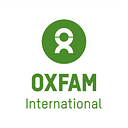Thousands push supermarket Lidl for more action on human rights: “No human suffering in our food”
Last year, Oxfam launched the Behind the Barcodes campaign to get 16 major supermarkets to take responsibility for ending human suffering in their food supply chains. Each year we track their progress. Recently published research showed that our supply chains are still rife with violations of human, labour and women’s rights.
Many supermarkets, including Lidl, lack robust policies and practices to address these violations. In fact, with a score of only 9% this year, Lidl is among the worst performing supermarkets in Oxfam’s Supermarket Scorecard.
For this reason, Oxfam and our supporters launched a public campaign push, starting in the UK and the Netherlands, asking Lidl to do more to protect the people who produce our food. Today, Oxfam handed in the signatures of concerned shoppers to Lidl in the Netherlands.
The power of the supermarkets
Supermarkets have the potential to make positive changes to the lives of millions of workers and farmers. With 10,000 stores in 32 countries in Europe and North America, Lidl has significant power — and responsibility — to tackle worker exploitation.
However, Lidl currently lacks many policies and practices, such as a policy for the proactive prevention of forced labour (i.e. by committing to the “employer pays principle”), a commitment to eliminate the use of unfair trading practices, and active engagement with trade unions and workers’ organizations in order to ensure that their voice is heard.
In addition, the company scores zero when it comes to policies to ensure gender equality. Lidl in the UK has recently announced it has signed up to the UN Women’s Empowerment Principles, which is a good first step to address gender issues in supply chains. However, we would like to see the whole company group follow suit.
Moreover, despite the fact that consumers and investors increasingly demand more transparency, Lidl does not disclose the names and locations of its suppliers, like other supermarkets such as Albert Heijn and Jumbo have committed to do.
The power of us, the shoppers
We know that shoppers want Lidl to do more to protect the people who produce our food:
- A total of 33,000 people have signed the petition
- Overall 61,000 people have viewed the campaign webpage
- In the UK, 360 people on the streets of Oxford, London, Manchester and Sheffield have heard first-hand about the campaign, and customer letters and consumer surveys have been handed into 4 Lidl stores in those cities.
These numbers and actions reflect consumer concern and demand for Lidl to take responsibility and know and show how they manage human suffering in their food supply chains.
Lidl’s reaction to Oxfam’s campaign
The campaign was broadly covered by many newspapers and food retail sector magazines. In the UK, The BBC, The Independent, The Telegraph, The Guardian, The Sun and The Grocer have all highlighted the campaign. In the Netherlands, the campaign message was covered by NRC, nu.nl and Distrifood.
In response, Lidl has publicly stated that they are “committed to working collaboratively with Oxfam, the wider industry and expert partners to drive further improvements throughout our supply chains.”
In the past year they have published a human rights policy and committed to undertaking human rights impact assessments over the coming year, to better understand the issues faced by workers in their supply chain. In its response to our campaign, Lidl also recognises that there is more that the company must continue to do.
We welcome this public statement , but we know that these policies are not sufficient to prevent human rights abuses in food supply chains.
What more should Lidl do to protect human rights in its supply chains?
In order to make progress and significantly improve, Oxfam is asking Lidl (and other supermarkets) to:
- Be more open and transparent about their supply chains by showing where they source their food from, and where they have concerns relating to human suffering.
- Ensure that they have strong policies in place to protect workers from human rights violations and inhumane working conditions.
- State publicly what they plan to do to ensure workers receive a living wage.
- Develop clear policies to ensure safe and decent work for women working in their food supply chains.
We appreciate that new policies and practices cannot be implemented overnight. Therefore, we ask that Lidl make public commitments to achieve these asks within a reasonable timeframe.
This way Oxfam and the people who have taken action with us can see Lidl is accountable. We can then support the company’s efforts to implement robust human and workers’ rights policies.
Lidl: step up your efforts!
Today, when we hand in our petition, we’re raising the voices of the 33,000 individuals in the Netherlands and UK who asked that Lidl significantly step up their efforts to improve human and workers’ rights in their supply chains.
We appreciate the constructive dialogue we are having with the company, but we want the company to move further and faster.
Our campaign plans will not change until we see Lidl publish a more ambitious set of commitments that are sufficient to bring about positive and meaningful change to the lives of the workers, aligned with the asks above.
Join the movement to end human suffering in our food!
Learn more about the Behind the Barcodes campaign, watch this short film:
This entry was posted on 18 November 2019, by Monica Romis, Oxfam Policy Advisor Private Sector, and Charlotte Vollaard, Oxfam Policy Advisor Business and Human Rights.
